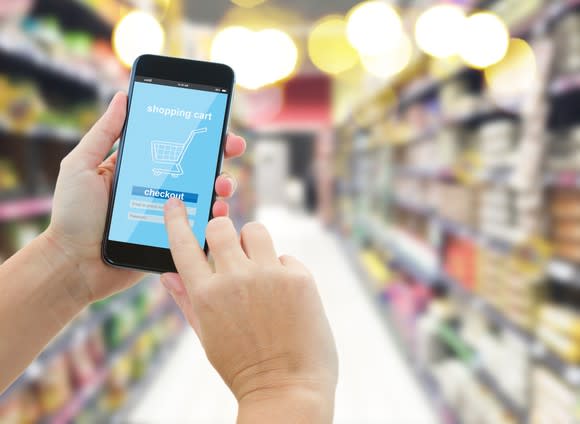Kroger Has Long-Term Plans for Tax Cut Benefits
Domestic retailers are thought to be some of the biggest beneficiaries of last year's tax legislation. These companies had long been hampered by paying a hefty tax rate on their profits, which added to the difficulties of competing with up-and-coming e-commerce disruptors. E-commerce king Amazon shook up the grocery industry in particular with last year's purchase of Whole Foods, and Kroger (NYSE: KR) was among the companies taking a hit. Its stock dropped 9% on the day the Amazon/Whole Foods deal was announced.
Still, when everyone's taxes are being cut by the same amount, those savings could potentially just get "competed away," as companies may cut prices further to gain market share. As grocery chains are now competing against the king of price cuts in Amazon, investors fear that's the case here.
Kroger forecasts a 22% tax rate this year, which is down from about 33% in 2016. That would provide about $250 million in pure tax savings, by my calculations. Kroger CEO William Rodney McMullen said during the company's recent fourth-quarter conference call with analysts that Kroger would take a "balanced approach to ensure tax reform benefits our associates, customers and shareholders," with shareholders set to receive about one-third of the benefit, and the rest going to customers (via lower prices) and employees (through increased pay and benefits). This allocation may have disappointed investors, as Kroger stock fell 12% the day fourth-quarter earnings were announced and that call was held.
Here's why Kroger's decision about how to use tax savings may have helped fuel the sell-off, but also why a drop in the price could have created a good entry point for long-term investors.

Kroger is using tax savings to fund tech investments. Image source: Getty Images.
Investing in employees
Behind every stock is a business, and behind every business are employees. Kroger spent considerable time on the conference call describing how it is developing plans to invest in its employees, "including education, wages, and retirement."
This is really interesting, as it seems the company is attempting to develop a comprehensive program to attract the best and the brightest. The ability to attract talent can differentiate a company, and Kroger finds itself in competition with a host of other retailers that are raising wages as the job market has shifted to one that favors employees. The U.S. unemployment rate has fallen to 4.1%, and recent comments from the Federal Reserve showed confidence in a strengthening economy.
While the exciting headlines have gone to Amazon, Kroger's biggest competitor is actually Walmart, which just announced a starting-pay increase to $11 per hour, as well as employee bonuses of up to $1,000, in the wake of the tax legislation.
It appears that Kroger is looking to one-up Walmart, with management saying, "We want to provide more than a one-time award." Stay tuned for more on this, because it appears Kroger is trying to solve a problem by doing something more creative regarding its entry-level employees.
More tech, lower prices
Kroger is also attempting to pre-empt the competitive threat from e-commerce by accelerating its own tech investments outlined in its Restock Kroger plan unveiled six months ago. These tech investments, which the company plans to accelerate this year, led to a 90% growth in e-commerce in the last quarter (though admittedly off a very small base). The new offerings include the order-and-pickup feature ClickList, and the addition of the Scan, Bag, and Go feature in 400 stores. The company has more than 2,500 retail food stores.
Following the e-commerce/omnichannel model, the increased tech will go hand in hand with lower prices, and investors are clearly wary of continuing price wars in the industry. Kroger's gross margin declined 31 basis points last quarter, which didn't exactly help alleviate those concerns.
On that topic, CFO Mike Schlotman said that the company "saw an opportunity" to "invest in ... price," which is business-speak for cutting prices. While that decreased company margins, Schlotman stressed that the cuts led to growth in both units sold and overall market share in the quarter, the 13th straight year of market share gains.
Will profits come?
Kroger contends that investments in both employees and e-commerce will be offset by gains in volume, lower costs of goods sold, and overall productivity. Still, its earnings guidance for the coming year of $1.95 to $2.15 per share is roughly flat with last year's $2.09.
Investors are penalizing any company that seems like it will lose margins to e-commerce, and the unexciting profit outlook is why Kroger's stock was down. But at $23 per share, Kroger now trades at around 11 times forward earnings. That means if Kroger's initiatives pay off, the stock is a bargain. However, if the company is having to invest more in pursuit of profit growth that never comes, Kroger will continue to languish -- no matter how much its taxes are cut.
More From The Motley Fool
John Mackey, CEO of Whole Foods Market, an Amazon subsidiary, is a member of The Motley Fool's board of directors. Billy Duberstein owns shares of Amazon and Kroger. His clients may have shares in the companies mentioned. The Motley Fool owns shares of and recommends Amazon. The Motley Fool is short shares of Kroger. The Motley Fool has a disclosure policy.

 Yahoo Finance
Yahoo Finance 